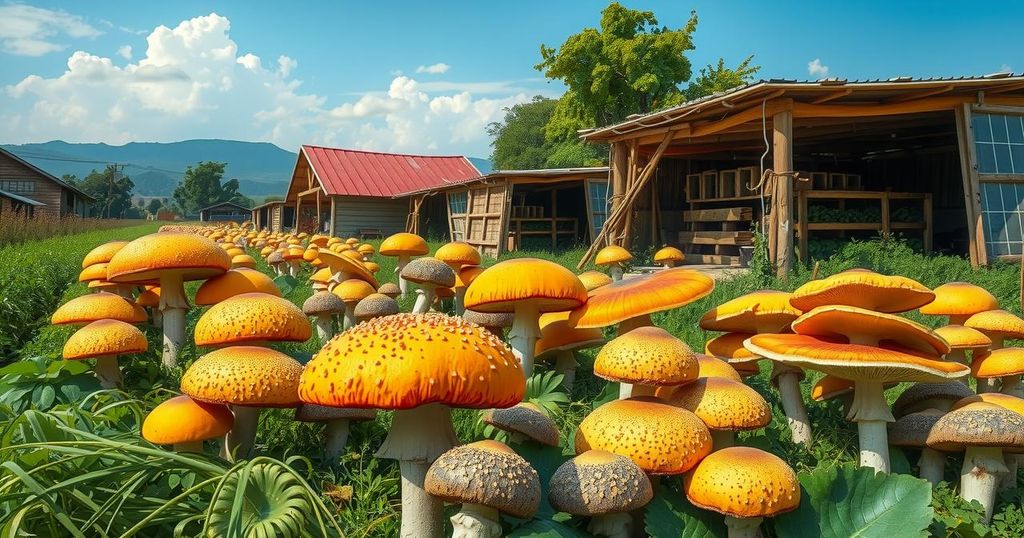Ethiopian Entrepreneurs Turn Mushrooms into Economic Opportunity
Mikias Tadesse, an Ethiopian entrepreneur, transforms his life from truck driver to mushroom farmer, creating a culinary movement in Ethiopia’s highlands. With support from Chinese experts, he navigates challenges of introducing mushrooms into local diets, expands his farm operations, and aims to export processed mushrooms, reshaping the country’s culinary horizons.
Mikias Tadesse, a 29-year-old entrepreneur from Ethiopia, has created quite a buzz with his mushroom farming business outside Addis Ababa. His journey from truck driver to successful mushroom farmer showcases not only individual ambition but also how a passion for fungus is reshaping culinary practices in his country. With increasing interest, Tadesse is not just changing diets, but also paving new economic paths in the highlands of Ethiopia.
It all began about three years ago when Tadesse stumbled upon some mushrooms growing in a Chinese road construction camp in a remote southern village. Curiosity led him to try a mushroom dish prepared by the camp’s Chinese chefs, which he found surprisingly delightful. “Intrigued by a sight foreign to my Ethiopian culinary experience and out of curiosity, I decided to try a mushroom dish prepared by the Chinese chefs. To my surprise, I really enjoyed the dish,” Tadesse reflected on that eye-opening moment.
Seeing mushrooms as a way to diversify Ethiopian cuisine and enhance food security sparked a lightbulb moment for Tadesse. He approached his Chinese colleagues to discuss starting a mushroom farm, where he received immediate, enthusiastic support and guidance. “Their response was immediate and very encouraging. They fully supported my business idea and promised to assist me in this new venture,” he said.
However, Tadesse would soon face a major hurdle: the general public’s unfamiliarity with mushrooms as a viable food source. “I faced major market resistance because most people simply did not see mushrooms as food,” he admitted. Despite his efforts to promote his products at many hotels and supermarkets in Addis Ababa, he encountered skepticism and numerous rejections.
Yet, Tadesse’s persistence paid off. He eventually gained some traction as select supermarkets agreed to stock his mushrooms. In the initial six months, the turnover was slow, and he often had to take half of his harvest back unsold, but he noticed demand growing as partnerships solidified. This prompted him to expand his operations, and now his farm boasts four cultivation sheds, with an output of 50 kg of various mushroom types each day.
“Though our farm produces an average of 50 kg of different varieties of mushrooms and has 12 dedicated workers, we are struggling to meet the growing demand,” Tadesse said. His gratitude towards the Chinese agricultural experts remains significant; he credits them for foundational support through training and providing quality resources necessary for cultivation.
Zheng Aibao, a seasoned expert in mushroom farming, and one of eight Chinese agricultural specialists in Ethiopia, highlighted the positive impact of their shared knowledge. “This is my third time in Ethiopia. I am glad to see the mushroom cultivation method introduced by Chinese experts is taking root in five farms in the country,” Zheng noted.
Looking ahead, Tadesse has plans to deepen his expertise further and even start exporting processed mushrooms. He believes that with collaborative efforts from both the government and private sectors, mushrooms can indeed make their way onto more dinner tables across Ethiopia, ultimately adding variety to local diets. “I believe that with coordinated efforts from both government and private sectors, mushrooms will end up on more dinner tables across Ethiopia and really help add variety to what people eat,” he emphasized.
The journey of Mikias Tadesse illustrates the profound impact of entrepreneurial spirit in transforming local diets and generating new economic opportunities in Ethiopia. By championing mushrooms as a new food source, and with ongoing support from Chinese agricultural experts, there is genuine hope for further culinary evolution in the region and beyond. Tadesse’s ambition to export processed fungi exemplifies a forward-looking vision that could elevate Ethiopian cuisine on a global scale.
Original Source: english.news.cn




Post Comment